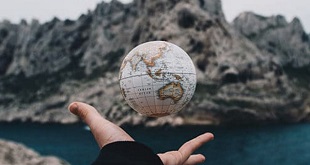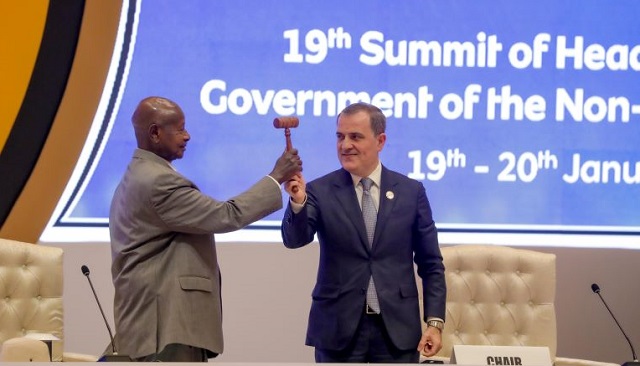
Can Museveni align them?
COVER STORY | THE INDEPENDENT | President Yoweri Museveni has this week taken over the leadership of the Non-Aligned Movement (NAM) for the next three years to 2027.
President Museveni’s tenure comes at a time of great uncertainty; for him personally and on the international scene. Personally, there is of course, the hurdle of the 2026 presidential election which he must jump. He has won re-election many times previously, but there is always uncertainty. Then there is also the issue of President Museveni’s relationship with recent occupants of the U.S. Whitehouse.
The NAM main office is in New York USA but Museveni had for all the years of President Donald Trump shunned events in the U.S, including the annual UN General Assembly Meetings in New York. But he returned in December 2022 to attend the US-Africa Leaders Summit that President Joe Biden hosted.
But recent events; including a slew of financial and travel sanctions that the Biden administration has slapped on several of Museveni’s lieutenants and deregistering Uganda from the African Growth and Opportunity Act (AGOA) free trade access over the Anti-homosexuality Act has recently erected fresh bumps on the road to rapprochement. This could complicate Museveni’s leadership of NAM in many western capitals.
Still on the global stage, there are unstable shifts in superpower supremacy among richer countries, South-to-South cooperation among poorer one and North-South dialogue between the rich nations and the poor.
In the face of these challenges, Museveni on Jan.19 at the Speke Resort Convention Centre at Munyonyo, Kampala, as he received the NAM leadership gavel from Azerbaijani foreign minister, Jeyhun Bayramov, who represented the outgoing NAM chairman, President IIham Heydar Oghlu Aliyev, gave his pledge.
“The strength of NAM should be used to exercise considerable influence particularly at the UN for the effective transformative process for a better common future,” he told fellow heads of state and government.
He said focus should be in negotiations for the Pact of the Future, the outcome document of the upcoming United Nations Summit of the Future to be held in New York in September, 2024.
“We should clearly define priorities that favour developing countries by maintaining unity, solidarity and collective coordination among our Member States,” he said.
And to deliver on this pledge, Museveni presented Uganda’s Permanent Representative at the UN in New York, Ambassador Adonia Ayebare to chair the Coordinating Bureau of NAM and lead Uganda’s team.
Museveni’s diplomatic skills and those of his key lieutenants overseeing the summit agenda have been tested as they tried to balance the diverse interests of all members at the Summit in Kampala. The main challenge is to balance the demands of the key players in NAM with those of the rest pf the 120 less powerful members of the group, and others like the U.S. and other western powers that are not NAM members but are critical absentee stakeholders.
Adonia Ayebare has been in the thick of the action. But his skills and those of his team will be tested even more in the coming three years.
The NAM Summit is happening in the context of a fluid international order with an evolving multipolar world, diminishing influence of the United Nations, and challenges on the economic dominance of the Bretton Woods institutions; the IMF and World Bank Group.
The key players at the five-day 19th NAM Summit and the G77+China meetings in Kampala are China, Russia, and India which are pushing to topple decades of American domination of the global political and economic space.
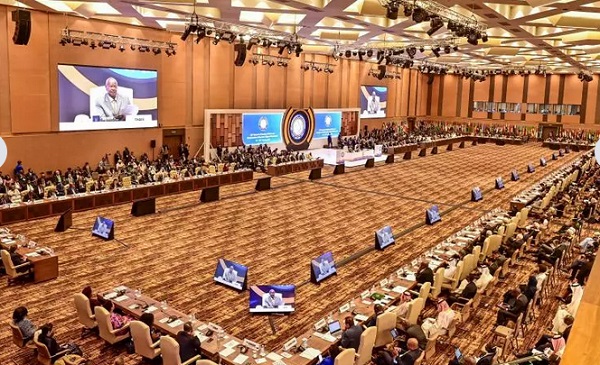
Specifically, global leaders are being challenged to take positions on the Israel war against Hamas in Gaza, the Russian war with Ukraine, the threat of conflict between Iran and its Arab neighbours and their impact on global trade in the Red Sea.
For African countries specifically, Museveni and his team have been challenged to moderate the demands of Ethiopia and Somalia on the status of Somaliland, the growing threat of military coups and terrorism in West Africa, and internal strife in Sudan, South Sudan, DR Congo, Libya, Mozambique, Cameroon, Central Africa Republic and more.
According to experts on NAM diplomacy, a conference such as the summit of the heads of state and government NAM “can do no more than issue media communiqués”.
That is the view of Prof. Keith Gottschalk, a political scientist at the University of the Western Cape, South Africa, who has written scholarly publications on African integration and policy space for developing countries.
The NAM has merely a modest coordinating office adjacent to the United Nations in New York, and even its conferences are three years or more apart, he notes and adds: “More precisely, NAM does not have a lobbying corps”.
According to him, the focus should be on getting agreement on some key issues and relying on NAM’s member states, individually, multilaterally, and through organisations such as the African Union, Association of South-East Asian Nations and the Union of South American Nations, to contest these issues in the forums of global governance.
The NAM is the largest multilateral platform in the world after the United Nations. In this sense, it is a powerful lobbying platform. For example, the Kampala NAM summit received confirmation to attend of several presidents and heads of government, prime ministers, and foreign ministers of more than 80 countries. It is still not clear how many finally attended. But the UN Secretary General Antonio Guterres arrived early.
The challenge, however, is getting them to agree on major positions since the leaders come with diverse ideological position. Up to this point, only anti-west rhetoric and third world nationalism have appeared to unite them. But new global challenges appear to be dividing them even on those positions.
So when different countries voted on a vote on March 2 at the UN General Assembly on a resolution demanding that Russia stops its offensive in Ukraine, and immediately withdraw all its troops, four of five countries that voted against were NAM members. These are Syria, North Korea, Eritrea and Belarus. But another 35 countries abstained and most of these, including Uganda, were also NAM members. Finally, of the 141 countries that voted for it, some were also NAM members.
At the Kampala Summit, along with other political, economic, and social issues, Israel’s relentless bombing of Gaza and Palestinian homes on the occupied West Bank is expected to feature.
Depending on how it is framed when the Ministers of the member States of NAM adopt a slew of documents such as the Kampala Declaration, a political declaration on Palestine at the Ministerial level could be tabled for consideration by the Heads of State and governments at the Summit.
Normally, NAM Summit organisers issue what is called “The Final Document” of the summit. The one issued by the 18th Summit of Heads of State and Government of NAM in Baku, Azerbaijan from October 25 – 26, 2019 was 250 pages long.
It covered global issues, development, social and human rights, and regional and sub-regional political issues which take up the bulk of the report. Since these later issues are tackled by region; Middle East, Africa, Asia, Latin America and the Caribbean, and Europe, it can be expected there will be a lot in the document. It appears each country lobbies to ensure that its issues get attention, although Israel and Occupied Palestinian Territory issues often take Centre stage.
Matters are complicated further because the issues that initially united the NAM members have vanished since the end of colonialism and the Cold War between the East and West in 1991. Initially, NAM member states united to avoid participation in military alliances of east and west, struggle for self-determination, support national liberation movements, and oppose apartheid.
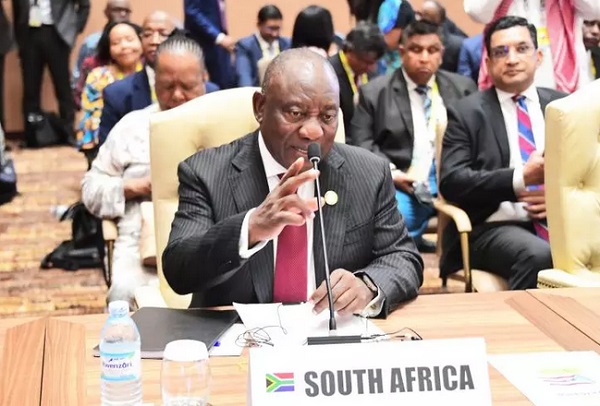
Since the end of the cold war came to an end and countries like India and China jumped from the basket of poor low developed countries to become emerging major powers, the NAM has become a lobby platform for building partnerships with as many countries as possible. As one writer put it. It has shifted from a platform for non-alignment to one for multi-alignments.
Reform of the United Nations has been a major issue for some time. Relatedly has been the issue of how the UN Secretary-General is appointed and representation on the UN Security Council.
Africa’s ambitions under NAM
African countries seeking trade, development finance, and integration into world markets that are dominated by the West, have been increasingly looking to China and Russia as allies. According to the Brookings institute, China has overtaken the U.S. as the main source of FDI for Africa since 2013. China contributes 18% of FDI to Africa.
South African President Cyril Ramaphosa has been pushing for a change from the aid for Africa agenda and message from America and the West since he became president in 2018.
“Africa should never be seen as a continent that needs generosity, we want to be treated as equals,” he said again while emphasising the importance of peace, investment and equitable partnerships at the Paris Climate and Finance Summit of world leaders on June 2023.
That could explain why Ramaphosa led a delegation of leaders from Africa on a peace mission to the warring capitals of Russia and Ukraine in mid-June 2023.
Ramaphosa and other African leaders possibly saw an opportunity to once-again highlight the continent’s emerging geo-strategic influence.
When they returned to the continent, Ramaphosa has said the trip was a success because it is “the first time African leaders embarked on a peace mission ‘beyond the shores of the continent’”.
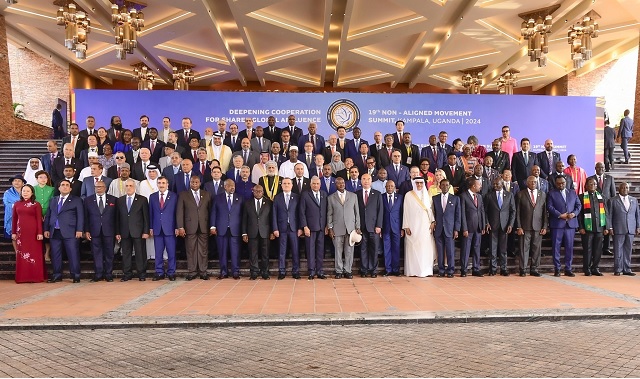
The delegation included Presidents Hakainde Hichilema of Zambia, Azali Assoumani of the Comoros who is Chairperson of the African Union, and Macky Sall of Senegal. Others were Prime Minister Mostafa Mabdouli of Egypt, Minister of State and Director of the Cabinet of Congo, Florent Ntsiba, and Special Envoy of the President of Uganda for Special Duties Ruhakana Rugunda.
South Africa’s Ramaphosa is considered very much a stalwart of Russian President Vladimir Putin together with President Museveni who was listed for the trip but pulled out at the last minute due to ill-health.
The neutrality option
At the time, controversial businessman Jean-Yves Ollivier, the 78-year old founder and head of the Brazzaville Foundation who arranged the mission, noted that in the Russia-Ukraine war, African countries are facing “a lot of pressure, from either the Russians or Americans, sometimes both, to pick sides.”
“The best way for Africa to get out of that is to play the role they are trying to play,” Ollivier told Newsweek magazine in May 2023. “Mr. Jacques”, as Jean-Yves Ollivier is known, was referencing how African leaders being courted by both Russia and the U.S had sat on the fence when the UN General Assembly became a battle field of East versus West geopolitics in 2022 over the resolution condemning Russia’s invasion of Ukraine. In the end, the resolution was supported by 141 UN member states but 25 abstained.
Then when the General Assembly voted to expel Russia from the Human Rights Council, 24 member states voted against and 58 abstained. Among the abstentions were influential African nations like South Africa, Nigeria, Egypt, and Uganda.
The NAM, which is over 50% African, has recently regained significance after years of purposeless flounder since the Cold War ended in 1991 and America emerged a unipolar superpower.
The 78-year old Museveni, who has been president of Uganda for 37 years and is assuming the chairmanship of the NAM, is the archetypal non-aligned leader of the pre-1991 East-West cold war era. He refuses to be lumped with either West or East.
“I am pro-myself. And I deal with other people according to how they relate with my own interest,” he says.
But African leaders and other NAM leaders appear aware that they are walking a tightrope between snubbing America and suffering economic sanctions or popularising their free agent ambitions and allowing to be courted by Russia, and China.
They recognise they will not have an easy time playing the East against the West and avoid getting sucked into the super power rivalry similar to the pre-1991 cold war era.
By condemning Western sanctions against Russia and attempting to rally an African audience for Zelenskyy, Mr Sall, for example, has been described as “showing blatant false naivety” by Paul-Simon Handy, a researcher at the Institute for Security Studies in Paris.
Slavoj Žižek, the Professor of Philosophy at the European Graduate School has dubbed such posturing as “an obvious dodge”.
“Those who would claim neutrality forfeit their standing to complain about the horrors of colonisation anywhere,” he wrote in a recent Project Syndicate article.
Of course neutrality is a technical concept under international law that is not being currently debated. Generally, however, it is the concept guiding the Non-Aligned Movement (NAM) whose member states invoke neutrality in reference to the rights and obligations in the face of international armed conflict as seen in the Russia’s invasion of Ukraine, the looming threat of China over Taiwan, and Israel military activity in Gaza and occupied Palestine.
According to Prof. Slavoj Žižek and others, African must choose to get either Russian guns or American lectures. Museveni as chairman of NAM must deal with that.
 The Independent Uganda: You get the Truth we Pay the Price
The Independent Uganda: You get the Truth we Pay the Price



